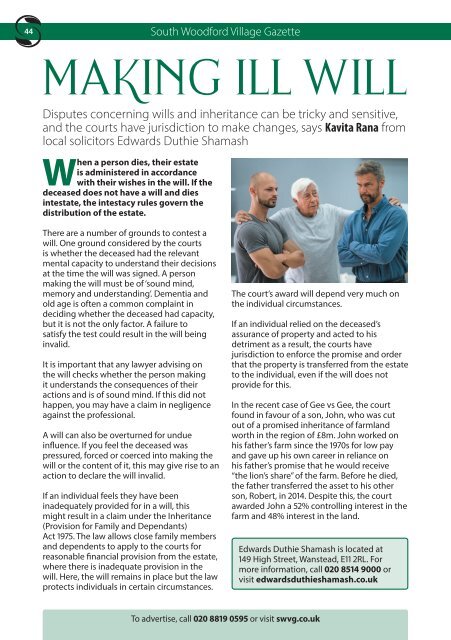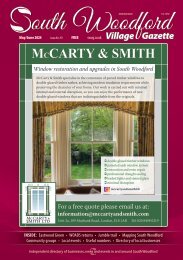Mar/Apr 2024
Create successful ePaper yourself
Turn your PDF publications into a flip-book with our unique Google optimized e-Paper software.
44<br />
South Woodford Village Gazette<br />
MAKING ILL WILL<br />
Disputes concerning wills and inheritance can be tricky and sensitive,<br />
and the courts have jurisdiction to make changes, says Kavita Rana from<br />
local solicitors Edwards Duthie Shamash<br />
When a person dies, their estate<br />
is administered in accordance<br />
with their wishes in the will. If the<br />
deceased does not have a will and dies<br />
intestate, the intestacy rules govern the<br />
distribution of the estate.<br />
There are a number of grounds to contest a<br />
will. One ground considered by the courts<br />
is whether the deceased had the relevant<br />
mental capacity to understand their decisions<br />
at the time the will was signed. A person<br />
making the will must be of ‘sound mind,<br />
memory and understanding’. Dementia and<br />
old age is often a common complaint in<br />
deciding whether the deceased had capacity,<br />
but it is not the only factor. A failure to<br />
satisfy the test could result in the will being<br />
invalid.<br />
It is important that any lawyer advising on<br />
the will checks whether the person making<br />
it understands the consequences of their<br />
actions and is of sound mind. If this did not<br />
happen, you may have a claim in negligence<br />
against the professional.<br />
A will can also be overturned for undue<br />
influence. If you feel the deceased was<br />
pressured, forced or coerced into making the<br />
will or the content of it, this may give rise to an<br />
action to declare the will invalid.<br />
If an individual feels they have been<br />
inadequately provided for in a will, this<br />
might result in a claim under the Inheritance<br />
(Provision for Family and Dependants)<br />
Act 1975. The law allows close family members<br />
and dependents to apply to the courts for<br />
reasonable financial provision from the estate,<br />
where there is inadequate provision in the<br />
will. Here, the will remains in place but the law<br />
protects individuals in certain circumstances.<br />
The court’s award will depend very much on<br />
the individual circumstances.<br />
If an individual relied on the deceased’s<br />
assurance of property and acted to his<br />
detriment as a result, the courts have<br />
jurisdiction to enforce the promise and order<br />
that the property is transferred from the estate<br />
to the individual, even if the will does not<br />
provide for this.<br />
In the recent case of Gee vs Gee, the court<br />
found in favour of a son, John, who was cut<br />
out of a promised inheritance of farmland<br />
worth in the region of £8m. John worked on<br />
his father’s farm since the 1970s for low pay<br />
and gave up his own career in reliance on<br />
his father’s promise that he would receive<br />
“the lion’s share” of the farm. Before he died,<br />
the father transferred the asset to his other<br />
son, Robert, in 2014. Despite this, the court<br />
awarded John a 52% controlling interest in the<br />
farm and 48% interest in the land.<br />
Edwards Duthie Shamash is located at<br />
149 High Street, Wanstead, E11 2RL. For<br />
more information, call 020 8514 9000 or<br />
visit edwardsduthieshamash.co.uk<br />
To advertise, call 020 8819 0595 or visit swvg.co.uk
















